ABC Religion and Ethics editor, Scott Stephens, delivers CPX’s annual Richard Johnson Lecture for 2021.
We commonly hear that the times in which we live are “unprecedented”. Not entirely without justification, when we consider the proliferation of technologies that flood our waking hours.
Yet beneath the busy surface of our media-saturated age, there lurks a temptation that is in no way unprecedented: the old temptation to live superficially – which is to say, inattentively. Like Shakespeare’s King Lear, we increasingly crave affection, fear irrelevance, are unsure who to trust, and so banish those who might wound us “out of our sight”.
The eyes are a moral organ. The contemptuous gaze can wither; the attentive glance gives life. At a time when so many distractions can cloud our vision, Scott Stephens urges us – in the tender words of the loyal Kent, in King Lear – to “see better”.
ABC Religion and Ethics editor, Scott Stephens, delivers CPX’s annual Richard Johnson Lecture for 2021.
ABC Religion and Ethics editor, Scott Stephens, answers questions after delivering CPX’s annual Richard Johnson Lecture for 2021.
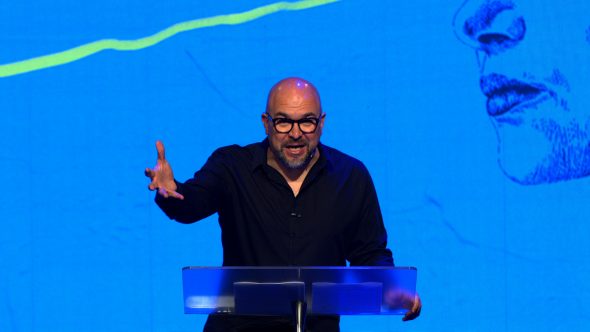
ABC Religion and Ethics editor, Scott Stephens, delivers CPX's annual Richard Johnson Lecture for 2021.
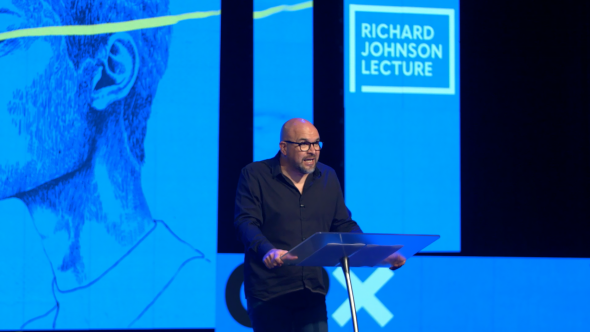
ABC Religion and Ethics editor, Scott Stephens, answers questions after delivering CPX's annual Richard Johnson Lecture for 2021.
Scott Stephens is the ABC’s Religion and Ethics online editor, and the co-host (with Waleed Aly) of The Minefield on ABC Radio National. His book On Contempt is forthcoming from Melbourne University Press.
"Everyone has the right to freedom of thought, conscience and religion", reads the Universal Declaration of Human Rights. But how did we get here?
Freedom of religion - or of no religion - is grounded on liberty of conscience, an idea with a back-story most of us are unaware of. In recovering this story, historian Sarah Irving-Stonebraker takes us all the way back to the ancient Middle East, and on a whirlwind tour through Europe, the Americas, and Australia, and asks: does the notion of religious liberty still have currency today?
In the 2020 Richard Johnson Lecture, historian Sarah Irving-Stonebreaker asks: does the notion of religious liberty still have currency today?
In the 2020 Richard Johnson Lecture, historian Sarah Irving-Stonebraker asks: does the notion of religious liberty still have currency today?
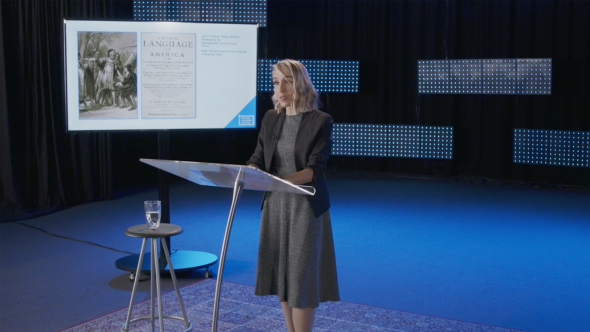
In the 2020 Richard Johnson Lecture, historian Sarah Irving-Stonebreaker asks: does the notion of religious liberty still have currency today?
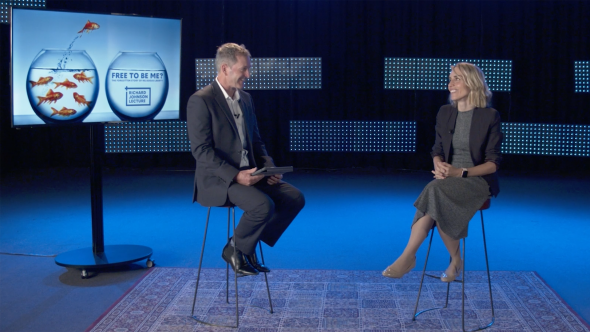
In the 2020 Richard Johnson Lecture, historian Sarah Irving-Stonebraker asks: does the notion of religious liberty still have currency today?
Dr Sarah Irving-Stonebraker is Senior Lecturer in History at Western Sydney University. She was awarded her PhD from the University of Cambridge (2007), after which she was a Junior Research Fellow at the University of Oxford then Assistant Professor at Florida State University. Her book Natural Science and the Origins of the British Empire (2008) was awarded The Royal Society of Literature and Jerwood Foundation Award for Non-Fiction.
The Western world is seeing a collapse in people’s faith in institutions, democracy, and even each other. Societies are fractured; political norms upended. Polarising debates centre on issues of identity, values, and belonging, and tribal voices muzzle the notion of a common good. In many countries, religious faith is becoming just one more marker of tribal division.
Tim Dixon offers a vision for how we might reunite increasingly fragmented societies.
In the 2019 Richard Johnson Lecture, Tim Dixon offers a vision for how we might reunite increasingly fragmented societies.
In the 2019 Richard Johnson Lecture, Tim Dixon offers a vision for how we might reunite increasingly fragmented societies

In the 2019 Richard Johnson Lecture, Tim Dixon offers a vision for how we might reunite increasingly fragmented societies.
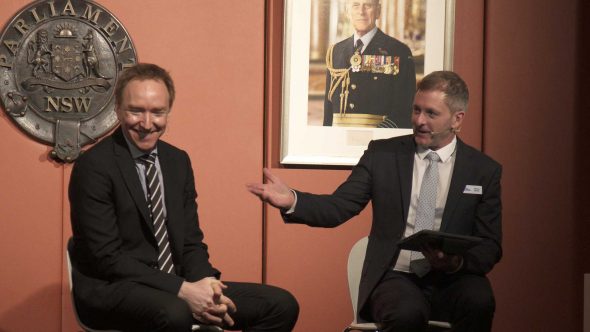
Q & A from the 2019 Richard Johnson Lecture with Tim Dixon and Simon Smart.
Tim Dixon is co-founder of More in Common, an international initiative which has published some of the world's leading research on the drivers of polarisation and social division. He has worked as chief speechwriter and economic adviser for two Australian Prime Ministers. He has helped start and grow social movement organisations around the world that have worked to protect civilians in Syria, address modern day slavery, promote gun control in the U.S., and engage faith communities in social justice.
It's obvious. Life should be respected. We should obey the rule of law. Humans have inalienable dignity. People are of equal worth. Freedom is good. Science is legitimate. And - as Life of Brian reminded us - "we are all individuals". I'm not!
Except that it is far from obvious. Nick Spencer is on a quest to rediscover our origin stories, and what makes the West the West.
Nick Spencer delivers the 2018 Richard Johnson Lecture, on what makes the West the West.
Nick Spencer responds to questions following the 2018 Richard Johnson Lecture.
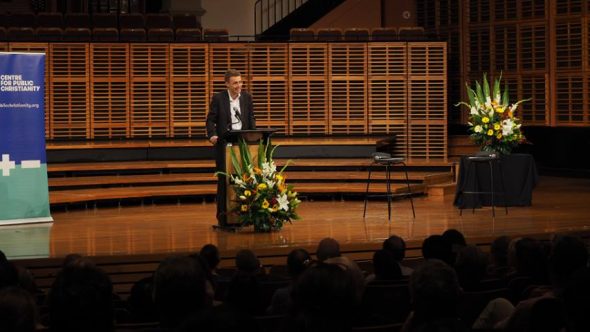
Nick Spencer delivers the 2018 Richard Johnson Lecture, on what makes the West the West.
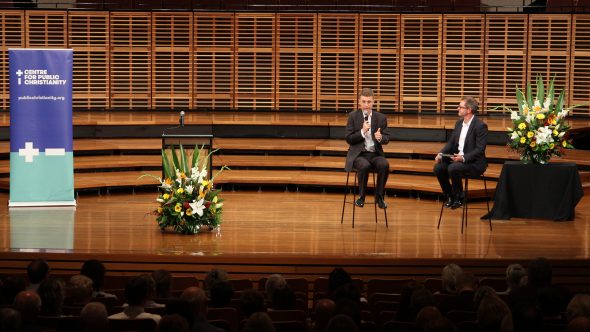
Nick Spencer responds to questions following the 2018 Richard Johnson Lecture.
Nick Spencer is Research Director of Theos Think Tank in London and author of several books including Atheists: The Origin of the Species (2014), The Evolution of the West: How Christianity Has Shaped Our Values (2016), The Mighty and the Almighty: How Political Leaders Do God (2017), and most recently The Political Samaritan: How Power Hijacked a Parable (2017). Nick has written for The Guardian and The Telegraph and has been described by The Economist as “like a prophet crying in the post-modern wilderness”.
The 2nd-century Greek philosopher Celsus famously dismissed Christianity as a religion of women, children, and slaves – that is to say, not to be taken seriously. But Christianity is much more likely to be condemned today, not for being a religion of women, but a religion against women. If gender equality mattered to the early church, what happened to it? What does Christianity’s chequered treatment of women mean for its credibility today? And is the Christian faith a force for the oppression of women, or for their flourishing?
Amy Orr-Ewing delivers the 2017 Richard Johnson Lecture, on whether Christian faith is oppressive or liberating for women.
Amy Orr-Ewing responds to questions following the 2017 Richard Johnson Lecture.
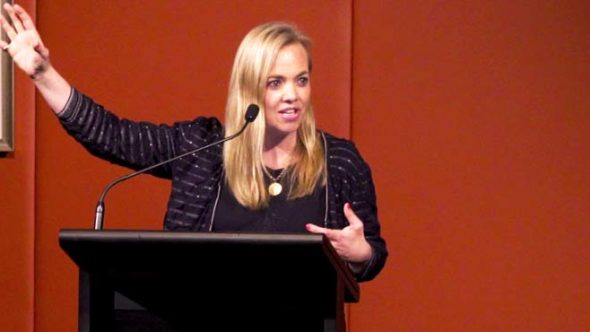
Amy Orr-Ewing delivers the 2017 Richard Johnson Lecture, on whether Christian faith is oppressive or liberating for women.
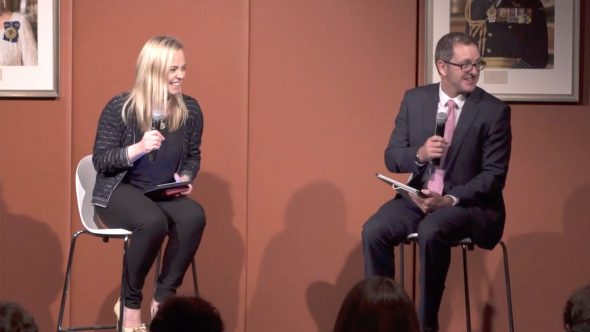
Amy Orr-Ewing responds to questions following the 2017 Richard Johnson Lecture.
Amy Orr-Ewing is Director of the Oxford Centre for Christian Apologetics (OCCA). Her doctoral studies at the University of Oxford focused on the British novelist, essayist, and “Christian humanist” Dorothy L. Sayers. The author of several books, Amy is also a widely sought-after international speaker addressing audiences at the White House and on Capitol Hill, as well as in the UK Parliament. She regularly appears on TV and radio, including on BBC Television and Radio 4, to comment on a variety of topics relating to the Christian faith.
It’s a widely held assumption in Western societies that religion has a peculiar tendency to promote violence. Indeed, much of our domestic and foreign policy assumes this. Is it a fair assumption? Are religions more inclined to promote violence than things like nationalism and access to oil? What even counts as “religion”? And what role have “secular” ideologies as well as “religious” ones played in fomenting violence? American philosopher William Cavanaugh offers some provocative arguments.
William Cavanaugh delivers the 2016 Richard Johnson Lecture, on the widely-held assumption that religion causes violence.
William Cavanaugh responds to questions following the 2016 Richard Johnson Lecture.
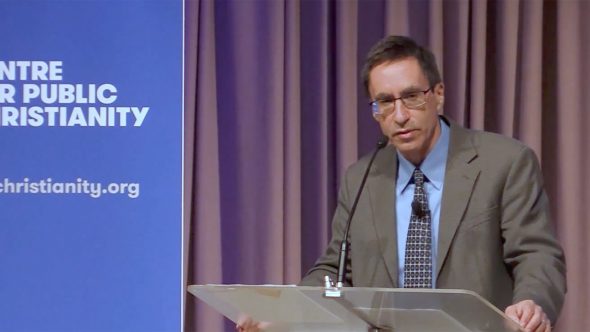
William Cavanaugh delivers the 2016 Richard Johnson Lecture, on the widely-held assumption that religion causes violence.
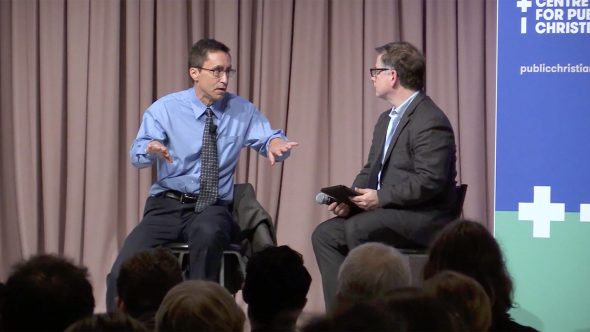
William Cavanaugh responds to questions following the 2016 Richard Johnson Lecture.
William T. Cavanaugh is a Professor of Theology at DePaul University in Chicago. He holds degrees from Notre Dame, Cambridge, and Duke University, and has worked as a lay associate with the Holy Cross order in a poor area of Santiago, Chile, as well as for the Center for Civil and Human Rights at the Notre Dame Law School. His areas of specialisation include political theology and economic ethics. He is the author of several books, including The Myth of Religious Violence: Secular Ideology and the Roots of Modern Conflict (2009) and Field Hospital: The Church’s Engagement with a Wounded World (2016).
The conflict between science and religion seems entrenched, even inevitable. But is it? Peter Harrison, one of the most important scholars working in the area of science and religion today, challenges our understanding of what has historically been meant by the concepts of "science" and "religion" - and reconstructs the true history of their turbulent relations.
Peter Harrison delivers the 2015 Richard Johnson Lecture, on the reputed conflict between science and religion.
Peter Harrison responds to questions following the 2015 Richard Johnson Lecture.
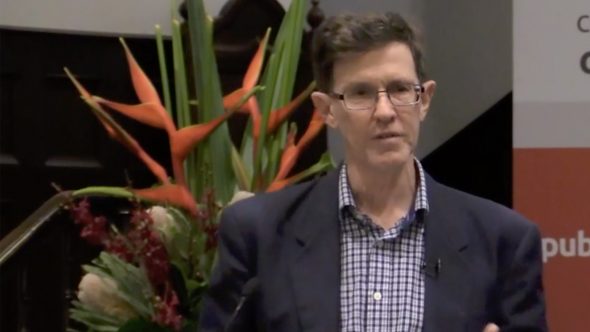
Peter Harrison delivers the 2015 Richard Johnson Lecture, on the reputed conflict between science and religion.

Peter Harrison responds to questions following the 2015 Richard Johnson Lecture.
Peter Harrison is an Australian Laureate Fellow at the University of Queensland. Before taking up his post at UQ he was the Idreos Professor of Science and Religion at the University of Oxford. He has published extensively in the area of intellectual history with a focus on the historical interactions between science and religion. A Fellow of the Australian Academy of the Humanities, he was the Gifford Lecturer at the University of Edinburgh in 2011. He is author or editor of six books, the most recent of which is The Territories of Science and Religion (Chicago, 2015).
The place of faith in the public square is a contested, and contentious, subject. At a time when some opponents of religion would rather faith remained a private affair - and some believers are tempted to agree - Miroslav Volf offers a different way that he believes can contribute to human flourishing for all people. (Video includes Q&A)
Miroslav Volf delivers the inaugural Richard Johnson Lecture, on religious exclusivism and political pluralism. (Video includes Q&A).
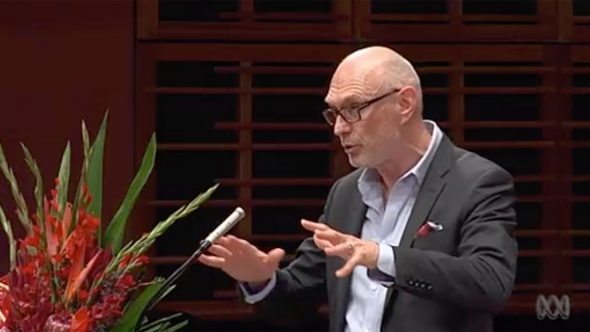
Miroslav Volf's lectures from the 'ReThinking: A Public Faith' conference.
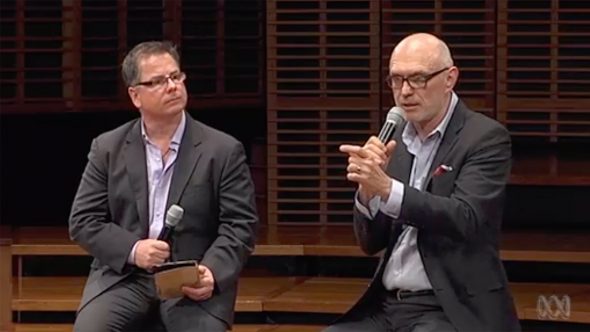
Miroslav Volf's lectures from the 'ReThinking: A Public Faith' conference.
Miroslav Volf is Founding Director of the Yale Centre for Faith and Culture, and the Henry B. Wright Professor of Systematic Theology at Yale Divinity School. He has written more than 150 editorials and 15 books, including Exclusion and Embrace (1996) and A Public Faith (2011). His upbringing in Croatia as the only Christian in a school of 3,500 was pivotal in the development of his faith. A victim of intense and sustained interrogation by the government of then communist Yugoslavia, much of Volf's work focuses on forgiveness and reconciliation. He maintains that the Christian vision of the world entails the possibility of overcoming the past for both the victim and the perpetrator of wrongs. He has been described as "one of the most celebrated theologians of our day" by former Archbishop of Canterbury Rowan Williams.